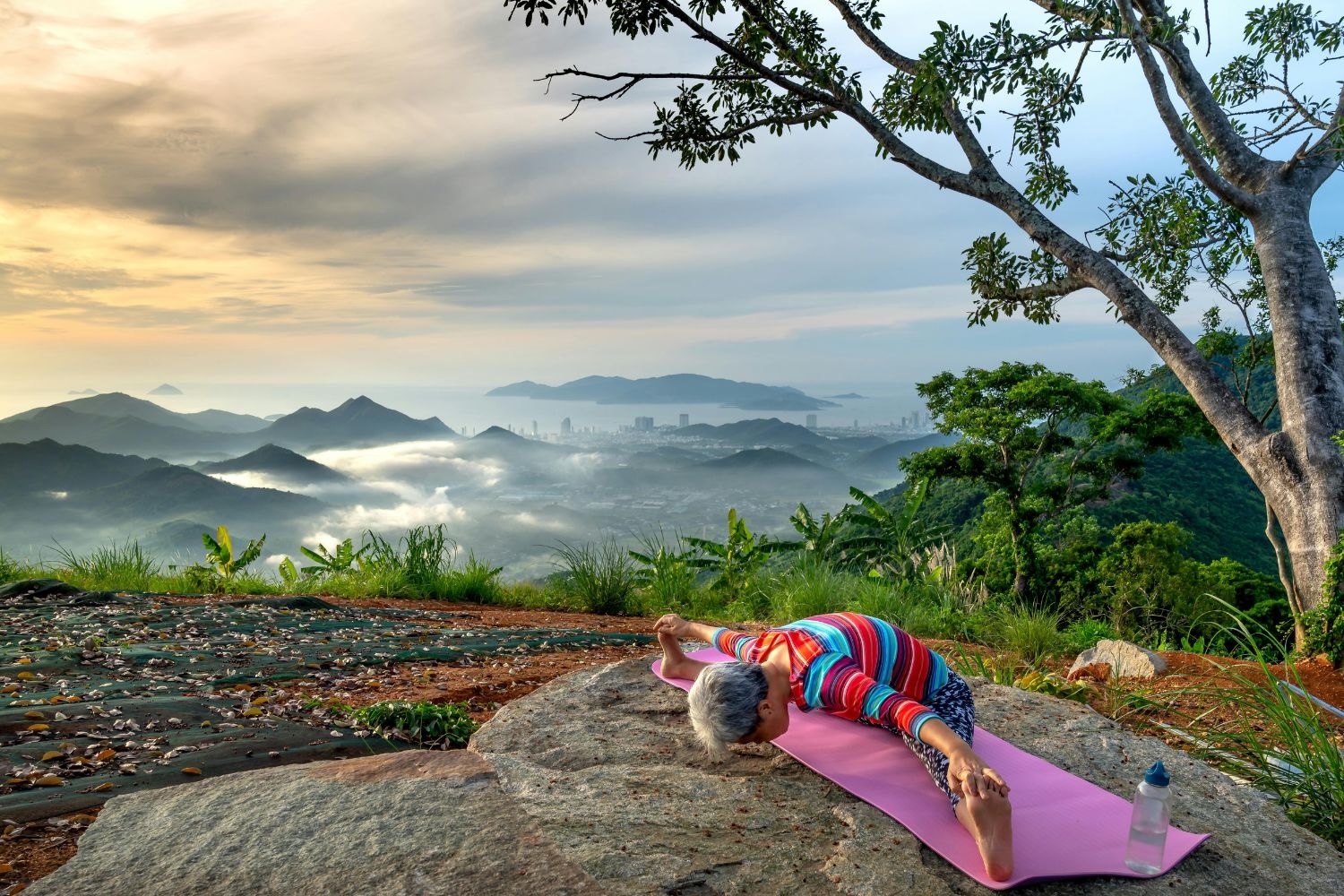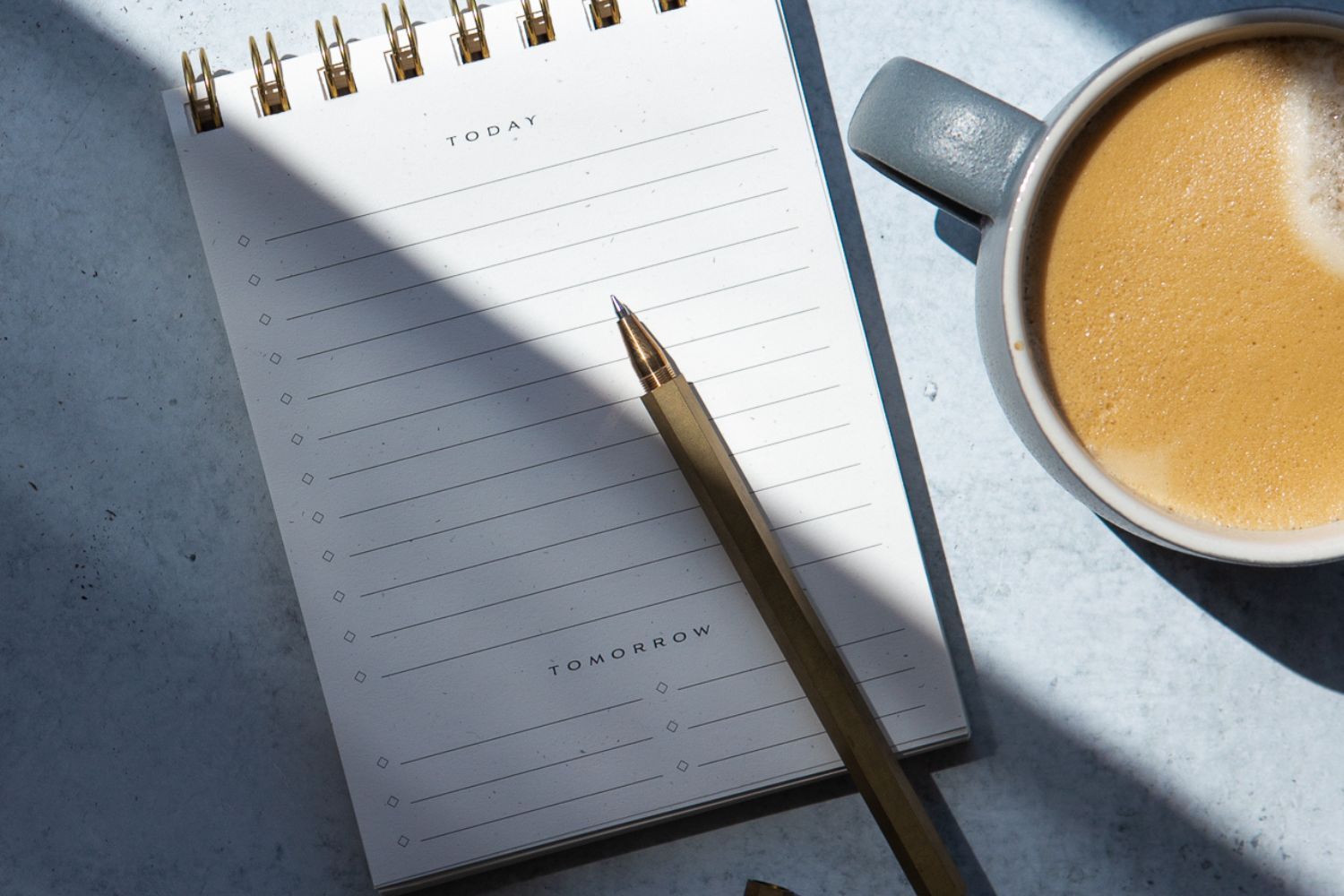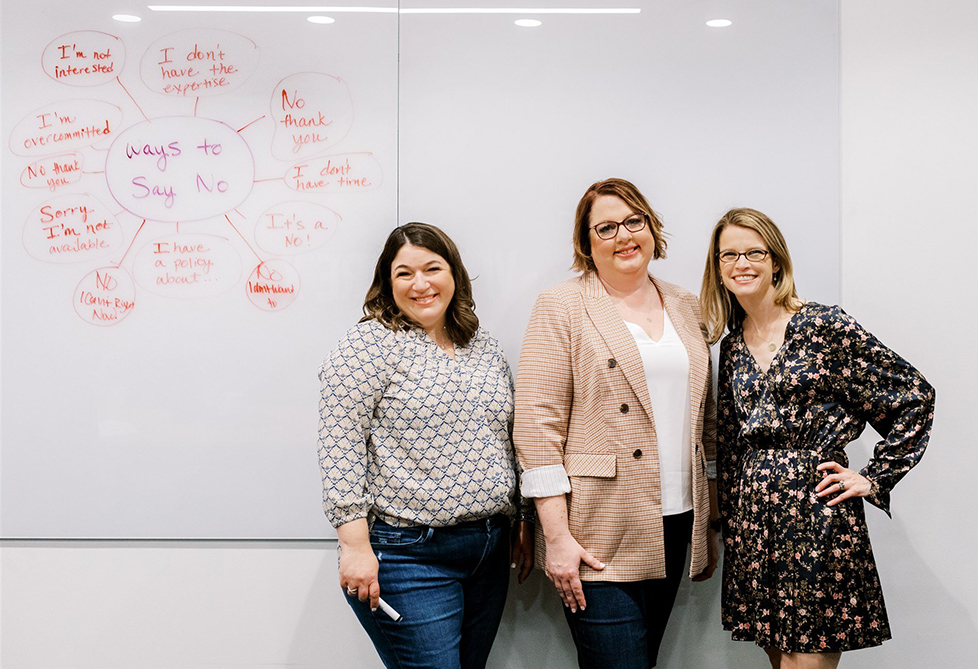
Want group coaching? Meet Badass Rebellion, the new movement for women in middle age
In late 2020, Avery Hoenig, Jamie Wilson, and Lucy Smith — longtime friends and practicing psychologists — met for brunch and ended up kicking off a conversation that hasn’t stopped yet. Full of pandemic pent-up social energy, they started catching up, sharing notes, and talking about the boatload of life stuff they felt pressured to magically manage, especially as moms. Their own mental health struggles were mirroring many of their clients’ and fortysomething friends’.
But there was one throughline that linked much of the overwhelm, loneliness, and downright exhaustion: Women are doing everything for everyone else and putting themselves deadass last. To help change this — and have some fun too — the trio started their first creative collaboration: Inspiration from the Couch, a podcast that’s going strong two years and over 75 episodes later.
Drawing upon their combined decades of work as therapists, along with their own life experiences, they offer candid, cut-through-the-crap advice that’s doable, relatable, and the same stuff they’re trying to follow themselves. But note, their good-for-you medicine is always delivered with a spoonful of sugar: humor, heart, and lessons in self-compassion.
In 2022, they expanded their reach with Badass Rebellion, a midlife group coaching and online resource to help women break out from the narratives, expectations, and self-defeating habits so they can find more joy, connection, and adventure during what could be a peak time in life.
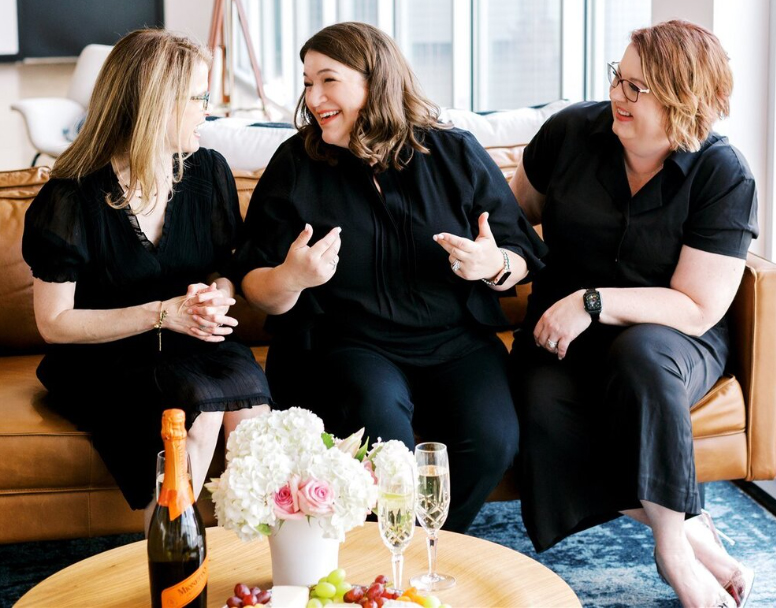
From left: The founders of Badass Rebellion: Psychologist-moms Avery Hoenig, PhD, Lucy Smith, PhD, and Jamie Wilson, PhD.
Badass Rebellion is a movement to help extraordinary women celebrate and savor a badass midlife. The Badass community ignites a rebellion against the story of the “midlife crisis,” replacing this outdated trope with reckoning, reclaiming, and celebrating during women’s midlife years. (Photo by Bethany Michaela)What’s more, you can sign up for their weekly badass bitch newsletter on their website. It’s always a fun read, but not just fluff-stuff — they dole out some helpful takeaways that are more action than theory.
We sat down with Avery, Jamie, and Lucy to talk about what they’re rebelling against, how they’re dealing with their peri ups and downs, and why they want women to try bold things in their 40s.
“Badass rebellion” makes me think of my teen years. Were you rebellious teenagers? What are you rebelling against now in your 40s?
Lucy: I was a TOTAL RULE FOLLOWER! Still kind of that way, as that wiring seems to be deeply ingrained! Some things we’re rebelling against include that thinking midlife is the beginning of the end, that appearance is paramount, and that it’s important to hold onto our youth.
Avery: I was a rule follower in my teens too! But I’ve been way more rebellious in my 40s — getting additional ear piercings and dying my hair teal and purple for my 40th birthday. I’d also add that we’re rebelling against the idea that you have to keep doing something a certain way just because it has always been done that way. And the unhelpful stories we’ve been told about midlife meaning over the hill.
Jamie: After I graduated high school the floodgates seemed to open and I went a little wild. I was raised in an extremely rigid, fundamentalist religion with tons of rules and expectations, so breaking free from that was like letting a tightly wound spring loose. In my 40s, I’m rebelling against the ideas that play is for kids and adulthood is about serious matters, that there’s a “right time” and a “right way” to do things, and that you have to be self-sacrificing as a woman.
You describe yourselves as falling into a “midlife slump” after turning 40. Can you describe what this was like and how you got out of it?
Jamie: For me, the midlife slump was about finding myself in the same ol’ rut, running on autopilot, being overcommitted and overwhelmed, and feeling apathetic about my life. Trying new things, particularly with others, and challenging myself helped. Even just observing the awesome creativity that humans possess is an inspiration for me.
Avery: Midlife is hard and I don’t know if I’m totally out of the slump. But I’m working my way through it and a HUGE part of that process is getting out of my comfort zone and daily grind. Doing new things has really been important to me in this phase of life. Just this month, I swam with otters, yoga-ed with goats, and treated myself to a petting zoo. I probably wouldn’t have done any of that five years ago.
Lucy: Working through a midlife slump — with ups and downs, like other phases — might be a better descriptor for me. It’s an iterative loop of listening to my intuition, making adjustments in my life, tuning in to intuition, and making more adjustments.
Why do women have such a hard time being honest about our own needs in relationships, and even with our own selves?
Lucy: Often, as women, we’re not taught to be honest with our thoughts and feelings. We’re more often conditioned to be nice and polite. So it’s a total paradigm shift to turn inward. We have to first connect with ourselves so we can even know what we want and need. And then we have to practice asking, which requires taking up space!
Jamie: It’s true, our culture tends to emphasize softer qualities in women — being cooperative, keeping the peace, being a gatherer — which are all fine qualities. However, they can camouflage our deeper desires, wants, and needs. I think everyone has a deep heartfelt desire to really be seen. But it’s a scary thing to allow others to see the authentic you and for you to be able to see yourself.
Avery: I totally agree. As a woman who grew up in the south, being nice and polite was prioritized. As I get older, I’ve started to value being kind over being nice. It’s nice to always say yes to everything, say what other people want to hear, and have no boundaries, needs, or wants. However, it’s kind to be honest in your feedback, set boundaries, and be mindful of your own needs and wants. I’ve come to realize that when I’m kind to myself, I’m much easier to be around!
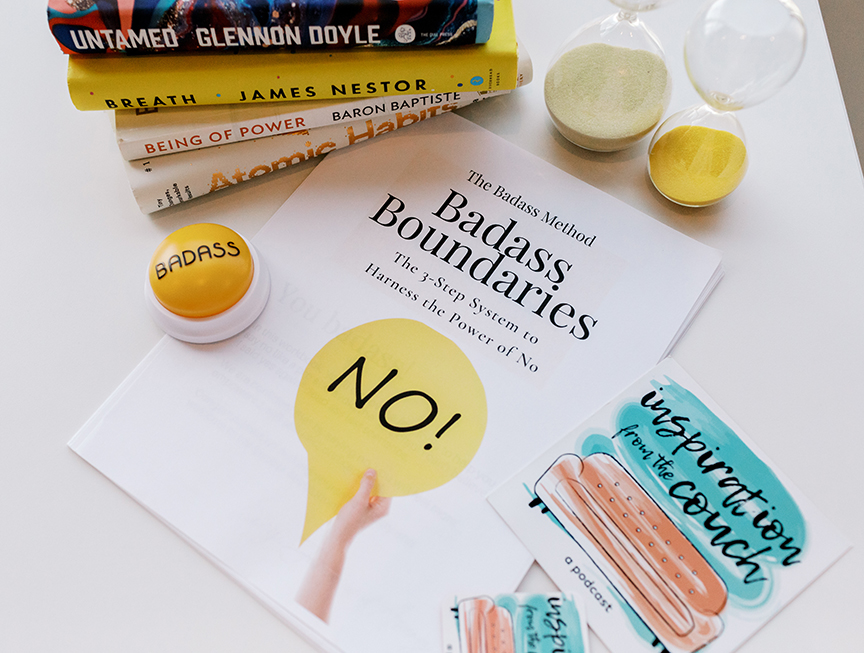
You offer a Badass Boundaries course and toolkit. Why is this such an important skill set to develop? And can you give some examples of how game changing it can be for women?
Avery: Setting boundaries is essentially drawing a line between what’s “me” and what’s “not me.” When we take on responsibility for the “not me” — everyone else’s tasks, feelings, and expectations — there’s very little room for the “me.” Boundaries are important because they allow us to recognize and put down the “not me,” and let go of the guilt that often comes with prioritizing our own needs.
Lucy: Boundaries and asking for help go hand and hand.
Jamie: Boundaries are first and foremost about protection and safety — whether that’s protecting yourself physically, emotionally, sexually, or psychologically. The word “no” is a game changer when it comes to advocating for what you will and will not accept.
You describe women in their 40s as looking for connection, adventure, and belonging and how that brought the three of you together, beginning with the podcast. What advice would you give to women who’re trying to find and grow new friendships?
Avery: Speak truth and show up authentically. It’s tempting to armor up and protect ourselves, but real connection and belonging require vulnerability. I think it starts by resisting the urge to just tell people what you think they want to hear. By being honest about what’s going on rather than just saying “I’m fine” when you aren’t.
Lucy: I agree, go deep, rather than sticking to the surface. Find a shared activity and prioritize these relationships. And remember, you only need a few people!
Jamie: But don’t wait for a new friend to show up on your doorstep. You’ll have to make an effort, and be persistent and intentional. And, most importantly, you’ll have to prioritize the connection for yourself.
After years spent in therapy practice, counseling some teens and their families, is there anything that’s surprised you now that you’re on the parenting side with a teen at home?
Lucy: How hard, complicated, and exhausting it is!
Avery: Holding multiple truths at once has been really important: I’m trying to do the right thing AND have no idea what to do next. I have an amazing kid AND there’s a lot that feels scary and out of control.
Jamie: I definitely don’t have all the answers. I feel comfortable letting my kids know that. Also, I’m seeing how important it is to model apologizing, accountability, and owning up to my own mistakes. My daughter’s turning 15 soon, and whatever she’s feeling — tears or grumpiness — I try to validate what’s going on with her. I tell her “I’m here; I’m available.” But I don’t think it’s a great thing to push, push, push teens to talk before they’re ready. With my son, using humor can help to de-escalate tense moments.
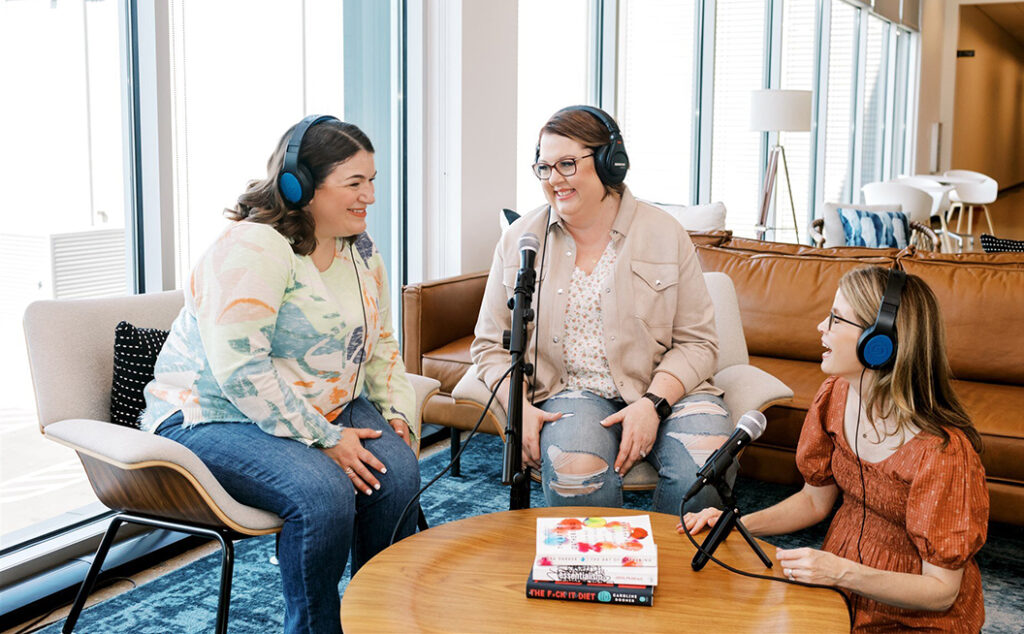
Can you talk a little bit about your own perimenopausal experiences? What helps you navigate your hormonal ups and downs?
Lucy: I’ve struggled with a “leaky uterus,” huge brain fog, and exhaustion. I’m back on hormones and allowing myself rest. And sometimes laugh at myself. Talking with others about what’s happening and comparing notes helps so I know I’m not alone.
Jamie: I’m dealing with slowed processing and mood swings, including irritability and rage. I also find myself needing to go to the bathroom without much warning. Reminds me of when my kids were little — when they said they needed to potty, they meant immediately. Talking with friends and family and having a good sense of humor help. I’m reading from experts in the field and getting my own therapy too.
Avery: I have a different experience because I had my uterus and ovaries removed when I was 38. On one hand, it was simpler because I knew the second that I was in menopause — I had my first hot flash in the hospital! But I didn’t have a lot of good information about what that meant exactly. I started hormones pretty soon, which seemed to help some with the hot flashes and night sweats. But my emotions were all over the place, and I didn’t really understand that it was related to menopause.
There’s so much stuff changing in the body after 40. Many women start dealing with more health issues. What advice can you give someone feeling anxious about all the bodily changes?
Avery: With my own health, it’s really been helpful to separate out the parts of the problem I can solve from the parts I can’t. I also try to self-advocate. Women, especially, may not know that they can say things like “This makes me feel uncomfortable” or “This is helpful.” Beyond that, I’m working on not doom-scrolling, or, as my husband calls it “feeding my nightmares”. When you start to look up health stuff online, the likelihood is high you’ll find something you don’t even need to worry about.
Jamie: For me, it’s important to name whatever I’m feeling, call it out, and not just simmer in it. I’ll let my family know “Hey, I’m just not feeling it today” and then let them know what I need.
Lucy: If you’re anxious, it can be helpful to let it all belong. Remember feelings are like waves. Let them come and crest and then move back out, in waves of ebb and flow. To deal with the physical aspects of anxiety, I recommend being still, putting your hands over your heart for a moment. Tuning inward through meditation and taking walks in nature can also be super helpful.
Summer’s almost here. For moms with kids at home, stress often surges during the summer months with the chaotic schedules and extra logistics. What tips can you give parents to help them keep their cool, and maybe even have a little summer fun too?
Avery: BREATHE. Summer is awesome AND summer sucks. The relaxed schedule can feel like a welcome break from the busy-ness of the school year, but we can also feel pressure to make it a fun and amazing time for everyone. There’ll be fun parts, hopefully, but it doesn’t have to be a magical experience from start to finish. So take the pressure off. I also want to just validate that this is a really stressful season. You aren’t doing it wrong if you are feeling stressed and overwhelmed! It’s really important to give yourself some compassion and let yourself off the hook. Summer is a great time to push the easy button as much as humanly possible.
Jamie: My advice is: Do NOT overschedule activities! There’s no reason that kids need to be in every activity possible, entertained and stimulated 24/7. When possible, allow kids to have ownership over some household tasks. If you have a parenting partner, get them involved in the planning and logistics so you’re not always the default parent.
Lucy: I agree with all that and I’ll add: don’t try to do it all yourself! Get help, outsource, and simplify where possible — fewer camps or one camp that goes for longer.
The Midst is about reimagining our 40s as a time of growth and exploration. Now that you’re a few years into your journey together, what advice would you give to people who are just starting to think about trying something new?
Lucy: Allow for stillness and quiet so you can tune in. Listen to the whispers of your intuition. Follow those nudges that both excite and terrify you. Know it’ll feel uncomfortable and kind of risky, which often means we’re stretching and growing.
Avery: Keep a beginner’s mindset. By age 40, you’ve likely mastered a lot of skills and it can be tempting to feel like you should be able to do things without difficulty. If you’re going to grow and explore, you’re going to have to try new things that you aren’t already good at. Reminding yourself you’re a beginner can help silence your inner critic and channel some self-compassion instead.
Jamie: When you have a lot of serious expectations about a new activity or experience, it can suck the joy right out of you! So have a sense of humor and lightness about it.
What’s your next goal for Badass Rebellion and where would you love to take it?
Avery: Our general goal for Badass Rebellion is to provide women in midlife good information about what’s happening to them — physically and emotionally — and give them a sense of belonging in a supportive community. I’d also love to host programming that could foster personal connection too. Either online or in person. Maybe even some retreats.
Lucy: We’d love to write a book, grow our audience, and get up and running with programming that really helps women in midlife. In fact, we’ve just launched a summer workshop series! We’re going to help you rebel against the tired tropes of being “dried up” in midlife. You’ll get access to tons of quality information, and we’ll walk alongside you as you reckon with where you are at this point, reclaim what YOU want going forward, and rejoice in the freedom, choice and power in this stage of life.
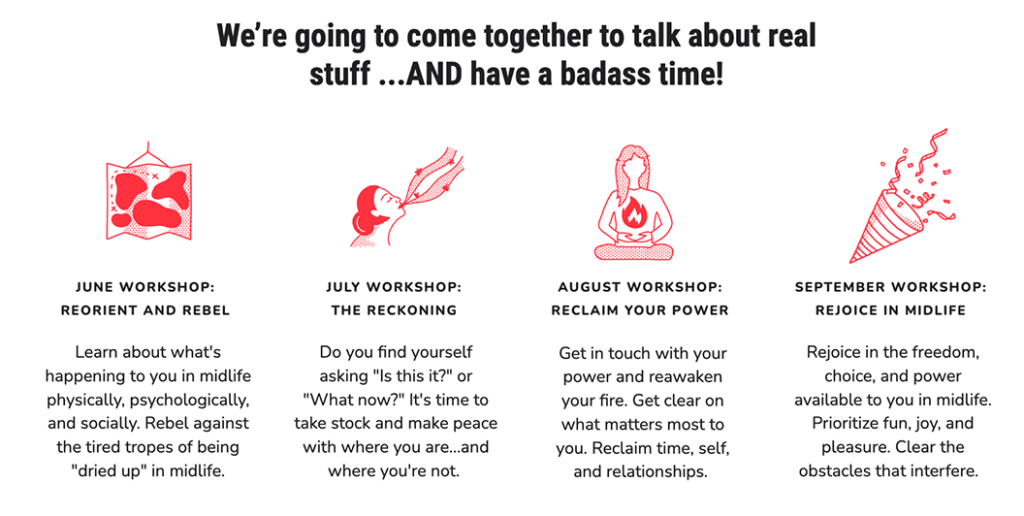
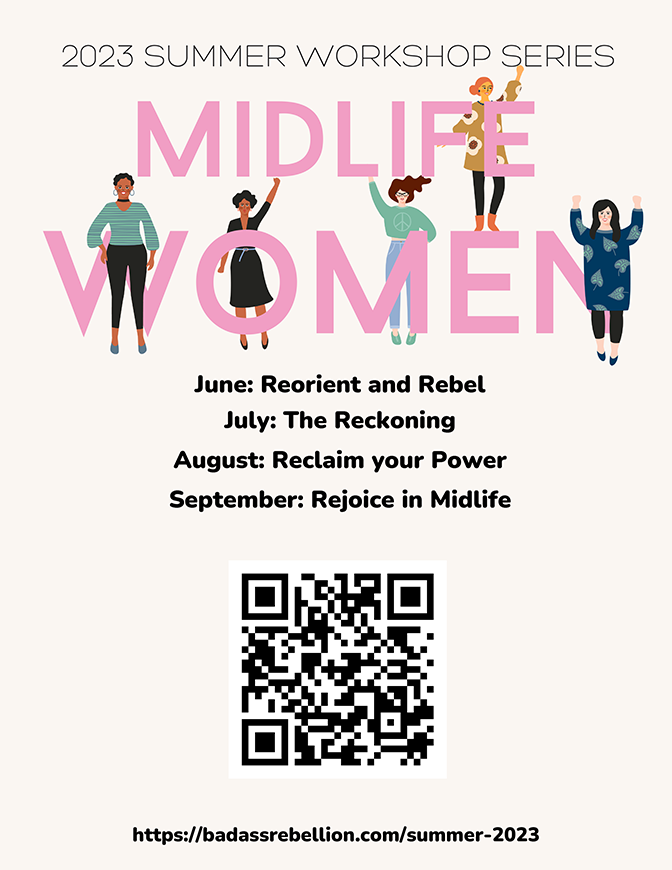
Jamie: Right now we’re focused on growing our community through our socials, Insta and Facebook, the Inspiration from the Couch podcast, and offerings on our website.

